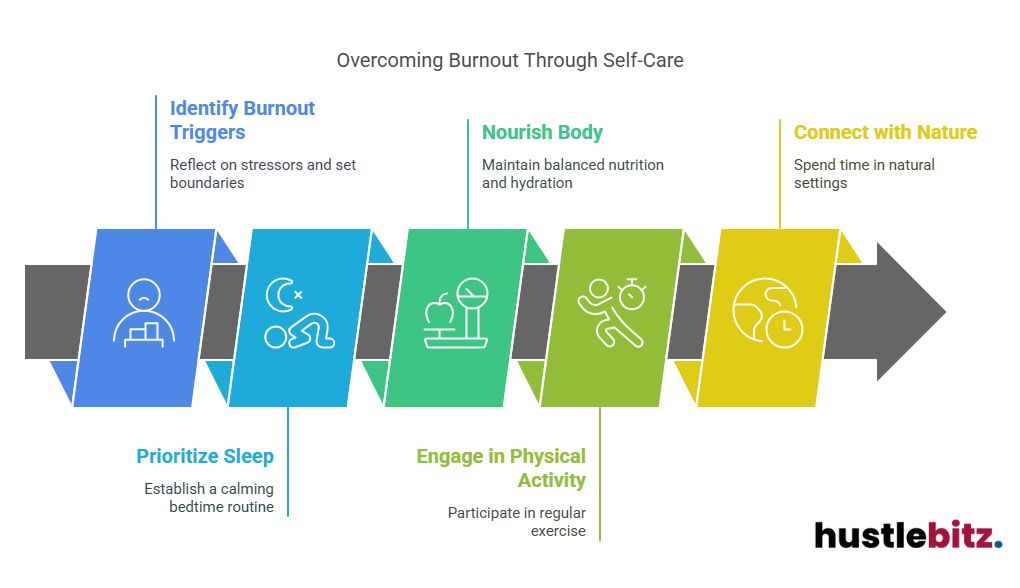To reclaim your energy and effectively manage burnout, consider implementing several self-care strategies. Start by recognizing your personal stress triggers and establish clear boundaries. Prioritize adequate sleep and nourishing your body with balanced nutrition and hydration. Regular physical activity, such as yoga or outdoor exercises, can alleviate burnout symptoms and rejuvenate your spirit. Engaging with nature through activities like hiking or gardening not only enhances mental clarity but also promotes relaxation. Building supportive connections and participating in community activities will further reinforce your resilience. Discover deeper insights and practical tips to enhance your self-care journey.
Key Takeaways
- Identify personal burnout triggers by reflecting on stressors and establishing clear emotional and personal boundaries.
- Prioritize sleep and create a calming bedtime routine to enhance overall well-being and combat fatigue.
- Nourish your body with balanced nutrition and hydration to restore energy levels and improve cognitive function.
- Engage in regular physical activity and explore various exercise forms to alleviate burnout symptoms and boost mood.
- Connect with nature through activities like hiking or gardening to promote relaxation and enhance mental clarity.

Understanding Burnout
Burnout is a state of emotional, physical, and mental exhaustion caused by prolonged and excessive stress, often resulting in diminished motivation and performance. This condition is particularly prevalent in high-demand environments, such as the helping professions, where individuals may prioritize the needs of others over their own well-being.
Understanding the causes of burnout is crucial for those who serve others; common triggers include heavy workloads, lack of control, and insufficient support from colleagues or supervisors.
The symptoms of burnout can manifest in various ways, including chronic fatigue, irritability, and a sense of helplessness. It is important to differentiate burnout from stress; while stress often stems from specific pressures that may be resolved, burnout is a more pervasive state that can lead to feelings of disillusionment and detachment from one’s work.
The long-term effects of workplace burnout can be detrimental, not only to the individual but also to the organizations that rely on their dedication and passion. If left unaddressed, workplace burnout can lead to serious health issues, including anxiety, depression, and physical ailments.
Recognizing these symptoms early can be pivotal in preventing a downward spiral. For those dedicated to serving others, fostering a healthy work-life balance and seeking support are vital steps in mitigating the impact of burnout. Understanding the dynamics of burnout is essential to reclaiming one’s energy and continuing to serve with compassion and effectiveness.
Recognizing Your Triggers

Identifying personal triggers for burnout is a crucial step in developing effective strategies for self-care and prevention. Understanding the nuances of stressors identification is essential for those dedicated to serving others. Common triggers often lie within workplace dynamics, where excessive demands and unclear expectations can lead to heightened stress levels. By recognizing these patterns, individuals can better navigate their work environment and prioritize their well-being.
Emotional awareness plays a pivotal role in this process. It involves tuning into one’s feelings and recognizing when stress begins to escalate. Individuals should be encouraged to reflect on their emotional responses to specific situations, which can reveal underlying triggers that may otherwise go unnoticed. This reflective practice not only fosters personal insight but also enhances one’s ability to manage relationships with colleagues and clients effectively.
Establishing personal boundaries is another vital component in recognizing burnout triggers. Setting limits on work hours, taking regular breaks, and learning to say no when necessary are all effective coping strategies to maintain a healthy balance. By asserting these boundaries, individuals can protect their energy and focus on delivering quality service without compromising their mental health.
Self-Care Relieves Burnout

Recognizing personal triggers for burnout lays the groundwork for implementing self-care strategies that can significantly alleviate stress and promote overall well-being. Self-care is not merely a luxury; it is an essential practice that empowers individuals to recharge and maintain their capacity to serve others effectively.
Incorporating mindfulness practices, such as meditation or deep-breathing exercises, can cultivate a sense of calm and clarity. Engaging in creative hobbies, whether painting, writing, or gardening, allows for self-expression and rejuvenation. Furthermore, nurturing social connections plays a vital role in mitigating feelings of isolation and providing emotional support.
Setting boundaries is equally crucial in protecting one’s energy. By clearly defining time for work and personal life, individuals can create a healthier balance. Additionally, a digital detox—taking a break from screens and social media—can help reduce the overwhelming nature of constant connectivity.
The following table outlines effective self-care strategies:
| Self-Care Strategy | Description | Benefits |
| Mindfulness Practices | Techniques to enhance present-moment awareness | Reduces stress, improves focus |
| Creative Hobbies | Engaging in artistic or hands-on activities | Boosts mood, fosters relaxation |
| Social Connections | Building and maintaining supportive relationships | Enhances belonging, reduces loneliness |
| Setting Boundaries | Defining limits on time and energy | Prevents overwhelm, promotes balance |
| Digital Detox | Taking breaks from digital devices | Reduces anxiety, enhances mindfulness |
Implementing these self-care strategies can greatly relieve burnout and enhance your ability to serve others compassionately.
Prioritizing Sleep and Rest

Adequate sleep and restorative rest are fundamental components in combating the effects of stress and maintaining overall well-being. For those dedicated to serving others, prioritizing sleep is essential for sustaining the energy and focus needed to support those around you. Establishing good sleep hygiene is a vital first step. This includes creating a calming environment conducive to rest, such as keeping your bedroom dark, cool, and quiet.
Incorporating restorative practices into your daily routine can significantly enhance your sleep quality. Engage in relaxation techniques, such as deep breathing exercises or gentle stretching, before bedtime. These methods help signal to your body that it is time to wind down and prepare for restorative sleep.
Developing consistent bedtime routines plays a critical role in promoting better sleep. Aim to go to bed and wake up at the same time each day, even on weekends. This consistency helps regulate your body’s internal clock, making it easier to fall asleep and wake up refreshed.
Additionally, consider implementing technology breaks in the hours leading up to sleep. Limiting screen time reduces exposure to blue light, which can interfere with melatonin production and disrupt your sleep cycle.
Nourishing Your Body

Nourishing your body with balanced nutrition is essential for restoring energy levels and enhancing resilience against burnout. Those who serve others often neglect their own dietary needs, leading to a cycle of fatigue and depletion. To combat this, embrace mindful eating, which involves paying attention to your hunger cues and savoring each meal. This practice not only fosters a deeper connection with food but also promotes a healthier relationship with nourishment.
Establishing sound hydration habits is equally crucial. Proper hydration supports cognitive function and physical well-being, enabling you to be more present and effective in your service to others. Aim to drink an adequate amount of water throughout the day, and consider herbal teas or infused water for added enjoyment.
Meal planning can be a powerful tool in maintaining nutrient balance. By preparing meals in advance, you can ensure that you have access to wholesome foods even on your busiest days. Focus on incorporating a variety of fruits, vegetables, whole grains, and lean proteins to optimize your nutrition.
Engaging in Physical Activity

In addition to maintaining a balanced diet, engaging in regular physical activity is vital for alleviating symptoms of burnout and promoting overall well-being. Physical activity not only enhances your physical health but also fosters mental resilience, providing a much-needed counterbalance to stress. By incorporating various forms of exercise into your routine, you can rejuvenate your spirit and cultivate a sense of community.
Consider integrating the following activities into your weekly schedule:
- Yoga routines: These practices enhance flexibility and mindfulness, allowing you to center yourself while reducing anxiety.
- Team sports: Engaging in team sports fosters camaraderie and teamwork, creating a supportive environment that encourages personal growth.
- Dance classes: These classes not only provide a fun outlet for self-expression but also serve as a vigorous workout that elevates your mood.
Moreover, exploring hiking trails and participating in outdoor workouts can help you connect with others while enjoying the benefits of fresh air and natural surroundings. Each of these activities offers a unique way to engage your body and mind, ultimately reducing feelings of burnout.
Connecting With Nature
Engaging with nature can significantly alleviate the symptoms of burnout by providing a restorative environment that promotes relaxation and mental clarity. Nature therapy offers a holistic approach to wellness, encouraging individuals to immerse themselves in the natural world. This can take many forms, including outdoor mindfulness practices that focus attention on the present moment, fostering a sense of peace and grounding.
One powerful method for reconnecting with nature is forest bathing, a practice rooted in Japanese tradition that encourages individuals to engage their senses while surrounded by trees. This immersive experience has been shown to reduce stress levels, enhance mood, and improve overall well-being.
Additionally, the gardening benefits cannot be overlooked; tending to plants not only provides a therapeutic outlet but also cultivates a sense of accomplishment and connection to the earth.
Wildlife observation serves as another enriching way to engage with nature, allowing individuals to witness the beauty and intricacies of the natural ecosystem. Observing animals in their habitats fosters a greater appreciation for life and can evoke a sense of wonder that combats feelings of burnout.
Incorporating these practices into your routine can create a nurturing space for restoration, enabling you to serve others more effectively. By prioritizing your connection with nature, you not only enhance your own well-being but also model healthy habits for those around you, fostering a culture of care and support.
Final Thoughts
Managing burnout requires a proactive approach to self-care that addresses both mental and physical well-being. By recognizing your personal triggers and incorporating strategies like mindfulness, nourishing your body, engaging in physical activity, and connecting with nature, you can reclaim your energy and build resilience. These practices not only restore balance but also enhance your ability to support others more effectively. Prioritizing sleep, setting boundaries, and creating restorative routines are key steps to long-term well-being. Remember, self-care is not a luxury—it’s essential to living a balanced and fulfilling life.




